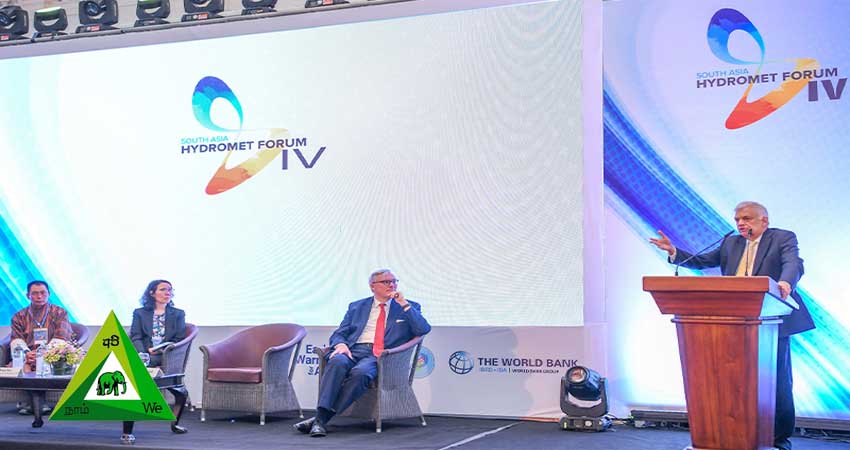President Ranil Wickremesinghe calls for regional collaboration in climate change mitigation efforts

While welcoming the participants to Colombo, Sri Lanka, to the South Asia Hydromet Forum (SAHF) IV President Ranil Wickremesinghe emphasized the nation’s commitment to address climate change through collaborative efforts at regional and international levels. In his address at the inaugural session at the Galle Face Hotel this morning (06), under the theme ‘Unlocking Regional Synergies’, President Wickremesinghe highlighted the pressing issues of adaptation and mitigation in combating climate change.
President Wickremesinghe reiterated Sri Lanka’s commitment to supporting regional efforts in climate change mitigation and adaptation. He highlighted initiatives such as the establishment of an international climate change university, aimed at providing postgraduate education and training to officials from various countries. Additionally, the President proposed the creation of a tropical belt as a carbon sink as discussed during COP 28 in Dubai, emphasizing the importance of private sector investment in sustainable development projects within this region.
Regarding mitigation efforts, President Wickremesinghe outlined Sri Lanka’s plans to enhance its meteorological organizations despite recent challenges posed by the COVID-19 pandemic and economic crises. He underscored the necessity of a comprehensive Hydromet regional network to effectively address climate change-related challenges, particularly in South Asia, where the adverse effects are mostly felt.
The forum, scheduled to run until February 8th, aims to facilitate discussions and collaborations on hydrology and meteorology-related initiatives in South Asia. SAHF initiated in 2018, connects National Meteorological and Hydrological Service providers (NMHSs) from the region to promote data and knowledge exchange, addressing technical challenges and enhancing collaboration.
Reflecting on the urgent need for action, President Wickremesinghe drew attention to the economic repercussions of climate change, citing potential GDP losses of up to 2% in low-income countries. He recounted Sri Lanka’s recent experiences with unexpected rainfall and highlighted the broader regional impacts, including those stemming from the melting of the Himalayas.
President Ranil Wickremesinghe underscored the necessity of establishing a regional network to facilitate collective action. In addition to this, the Sri Lankan government is actively promoting two key initiatives. Firstly, plans are underway to establish an international climate change university, designed to offer postgraduate programs akin to those provided by institutions like the East West Centre in Hawaii. Discussions are on-going with various countries and institutions to ensure its establishment as a stakeholder university, aimed at fostering comprehensive engagement. This endeavour is expected to play a vital role in addressing climate challenges not only in Sri Lanka but also across the region and in Africa.
Secondly, President Ranil Wickremesinghe outlined a significant proposal presented at the Dubai COP28, emphasizing the concept of utilizing the tropical belt as a carbon sink. Highlighting the potential of the tropical belt, with its diverse ecosystems including marshes and forests, to absorb carbon emissions, he underscored its suitability as a prime region for carbon sequestration. The President stressed the importance of facilitating private sector investment in these countries to support such initiatives, emphasizing that leveraging private investments is crucial for achieving sustainable development goals.
He emphasized that while traditional sources of aid may not suffice, attracting private sector investments could yield substantial benefits for all parties involved. Moreover, President Wickremesinghe highlighted the collaborative efforts within the Indian Ocean Rim Association (IORA) to explore opportunities across the region. To advance this proposal, he announced plans to establish a panel of experts to conduct in-depth studies.
Furthermore, President Wickremesinghe discussed potential funding mechanisms, suggesting the establishment of a loss and damage fund to address residual challenges. While acknowledging the challenges of securing funding solely for loss and damage, he proposed exploring alternative avenues, including debt relief for countries willing to invest in climate mitigation efforts within the tropical belt. These measures, he asserted, are essential for realizing the potential of the tropical belt as a key contributor to global carbon reduction efforts.
President Wickremesinghe concluded by expressing hope that the discussions at the forum would lead to innovative solutions and initiatives to tackle climate change in the region. He encouraged participants to contribute their ideas and expertise to on-going projects aimed at climate change mitigation and adaptation.
Co-Chair of the South Asia Hydromet Forum (SAHF) and Director of the National Centre for Hydrology and Meteorology in Bhutan, Karma Dupchu, along with esteemed guests including Director of the South Asia Region at the World Bank (WB), Dina Umali-Deininger, and High Commissioner of the United Kingdom, Andrew Patrick, convened at the forum. Also in attendance were Director for Regional Integration in South Asia at the World Bank, Cecil Fruman, and Secretary-General of the World Meteorological Organization (WMO), Celeste Saulo, among other distinguished participants from the region.







